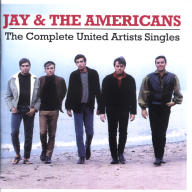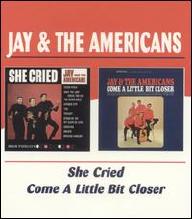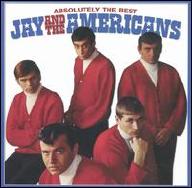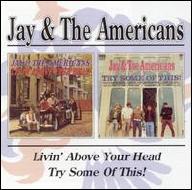The Jay the Americans story begins in 1959, when three students attending Far Rockaway High in Belle Harbor, New York decided to form a vocal group. Kenny Vance (aka Kenny Rosenberg), Sydelle Sherman, and Sandy Deanne (aka Sandy Yuguda) started singing together as the Harbor Lites, and they came to the attention of Stan Feldman, who lived in their neighborhood and ran a small record label, Ivy Records. Feldman took a chance on the trio, and released their debut single, "Is That Too Much to Ask" b/w "What Would I Do Without You." It became a regional hit, but Vance and Deanne felt they'd have greater success if they were in an all-male group and wanted to put together an act without Sherman. Their manager, Jim Gribble, was also representing the Mystics, who had landed a hit with "Hushabye." After their lead singer quit the group, the Mystics brought in a talented new vocalist, John Jay Traynor, but he wasn't happy with his new gig. Traynor teamed up with Vance and Deanne, and with the addition of Deanne's friend Howie Kane (aka Howie Kirschenbaum), they had a new quartet. They called the group Jay the Americans.
The legendary songwriting and production duo Jerry Leiber and Mike Stoller took on the new group and helped them land a contract with United Artists Records. Their first single as Jay the Americans, a cover of "Tonight" from the musical West Side Story released in 1961, was only a modest success, and their next release, 1962's "Dawning" fared no better until a disc jockey began playing the flipside, "She Cried." That number clicked, and "She Cried" rose to number five on the Top Singles charts. The quartet was rushed into the studio to cut follow-up material as well as an album (1962's She Cried), but when their next three singles failed to make the charts, Traynor, who was buckling under the strain of their busy touring schedule, decided to leave the act. Needing a new lead singer, Marty Sanders (aka Marty Kupersmith), a guitarist who had started performing with the combo, suggested a vocalist he'd worked with, David Blatt, who was selling shoes to make ends meet. Blatt's a cappella rendition of "Cara Mia" at his audition convinced the Americans they'd found their man, and after adopting the stage name Jay Black, he joined them in the studio to cut a patriotic Leiber Stoller number called "Only in America." Fortified by Black's soaring lead vocal, the single peaked at number 25 in 1963, and Jay the Americans were back in business.
The next two Jay the Americans singles -- "Come Dance with Me" and "To Wait for Love" -- didn't make much of an impact, but 1964's melodramatic "Come a Little Bit Closer," which made the most of Black's emotive vocal style, became their biggest hit, making it to number three, while "Let's Lock the Door (And Throw Away the Key)" just missed the Top Ten, peaking at number 11. Their new success landed Jay the Americans an opening slot of the Beatles' first United States tour, and they'd also share the bill with the Rolling Stones later that year. In 1965, Jay the Americans recorded the song that won Jay Black the gig, and "Cara Mia," perhaps Black's definitive performance, took them back to the Top Ten, rising to number four, and they would hit the Top 20 twice more that year, with "Some Enchanted Evening" and "Sunday and Me," the latter one of the first successful copyrights for a young tunesmith named Neil Diamond.
While 1966's cover of Roy Orbison's "Crying" was a hit that reached number 25 on the charts, it marked a period where Jay the Americans were losing their touch as hitmakers. They continued to enjoy success as a live act, especially in New York City, but the continued popularity of the British Invasion groups, and the rise of sunshine pop and psychedelic music, made the group seem out of step with what was happening in rock (though in a very real sense that was also part of their appeal). They made efforts to update their sound on albums like 1966's Livin' Above Your Head and 1967's Try Some of This, but while their core audience remained loyal, radio didn't pay much attention. In 1969, Jay the Americans delivered the LP Sands of Time, which saw them covering classic songs of the doo wop era with production and arrangements that acknowledged the present while staying true to the mood of the 1950s. It was an experiment that worked -- Sands of Time would become their highest-charting album, rising to number 51 on the Top 200, and it spawned their final Top Ten single, "This Magic Moment." The group followed a similar formula for the 1970 album Wax Museum, and later that year, they brought out Capture the Moment, an exercise in more contemporary styles. After releasing the single "There Goes My Baby" in 1971, the group stepped away from recording, and in 1974, Jay the Americans broke up.
After the split, Black worked as a solo act, Vance moved into studio work and performed with a doo wop revival act called the Planotones, Deanne worked as an A&R executive and theater director, Sanders enjoyed success as a songwriter (he penned "Bad Reputation" for Joan Jett), and Kane transitioned into social work. In 2006, after Black was forced to sell the rights to the name Jay the Americans, a new version of the group was formed, with Sandy Deanne, Howie Kane, and Marty Sanders as part of the lineup. This edition of the act toured frequently and would put out two albums, 2010's 'Til the End of Time and 2011's Keepin' the Music Alive. Jay Traynor, the original "Jay," died of liver cancer in Tampa, Florida on January 2, 2014; he was 70 years old. Jay Black died in Queens, New York on October 22, 2021 from pneumonia; he was 82 years old. ~ Mark Deming, Rovi
















